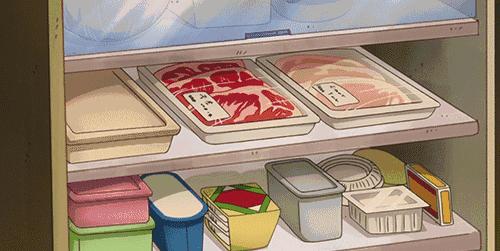It's time to prepare new year goods again, beef and mutton, sausages, bacon, milk, tea, dried fruits...
Many people buy them back, stuff them into the refrigerator, and leave them alone, thinking that when they need to eat, they can take them out and heat them.
Can this really be the case?
What foods are suitable for the refrigerator in life? What are not suitable for the refrigerator? If I put it in the refrigerator, how long can I leave it? What should I do if I want to put it longer? Let's take a look!

(Source: soogif)
Directly on the dry goods, first of all, let's talk about which foods are not suitable for the refrigerator:
Potato refrigeration can cause it to turn black during cooking and produce an unpleasant sweetness[1];
Some baked goods (such as whole wheat bread) are easily dried and hardened if refrigerated[2];
Cucumbers are refrigerated in the refrigerator for more than 3 days, and the epidermis will have a water-soaked appearance and the flavor will deteriorate[2];
Underripe tropical fruits (e.g., bananas, mangoes) that are not only difficult to ripen if refrigerated, but also prone to "frostbite"[2] (e.g., bananas turn black);
Milk powder, tea leaves, and coffee that have been opened, if refrigerated, if the seal is not good, it is easy to absorb moisture and deteriorate;
Chocolate is easily put into the refrigerator to surface "white frost", the taste becomes rough;
Foods with low moisture such as biscuits, candy, and pickles, or foods with high sugar and salt concentrations, are a waste of electricity and space in the refrigerator.
(Swipe up and down to view, long press to save the picture)
1. Cereals
Whole Grains:
Generally placed in a cool, dry place, it can be stored for several months, and if frozen, the storage time can be doubled [1].
Starchy staple foods:
Freezing should be controlled within 3 months [1].
2. Vegetables
Green leafy vegetables, okra, asparagus, etc., preferably refrigerated for no more than 3 days [1];
Edamame, peas, broccoli, cauliflower (white), etc., can be refrigerated for 3 to 5 days [1];
Cabbage, carrots, onions, pumpkins, etc., can be refrigerated for a week or two, or even two or three months [1].
3. Fruits
Depending on how ripe the fruit is, try to eat it within a few days [1].
4. Livestock and poultry, fish, shrimp, crabs and shellfish
refrigeration:
Raw animals: no more than 3 to 5 days (slightly longer than other meats)[1];
Raw whole poultry, raw fish, chopped meat, animal offal: not more than 1 to 2 days [1];
Live shrimp and crab shellfish: about 1 day [1];
Cooked meat, processed meat products: preferably not more than 3 days [1][5];
Cooked fish and shellfish: not more than 3 to 4 days [1].
frozen:
Raw meat: not more than 4 to 12 months [1];
Raw whole poultry: chicken not more than 1 year old, duck, goose not more than half a year [1].
5. Eggs
In the cold room, raw eggs can be stored for 3 to 5 weeks, and boiled eggs can be stored for 1 week [1].
6. Milk and dairy products, soy products
Milk is used according to the date on the package, yogurt is 1 to 2 weeks, and tofu is not more than 1 week [1].
Milk is not more than 3 months, yogurt is not more than 1 to 2 months, and tofu can be up to 5 months [1].
7. Beverages
After opening, juices, vegetable juices, alcohol, etc., such as refrigeration, should be drunk within one or two days [1].
8. Leftovers
Leftovers from alternate meals and overnight can be refrigerated for up to 3 to 4 days and frozen for 1 to 2 months [1], but it is recommended that leafy green vegetables be eaten as soon as possible, not every other meal or overnight.
Special Note:
If the food is kept under frozen conditions, it can be stored indefinitely, and the recommended cryopreservation time in the table refers to the time to "maintain a good flavor taste", not "the time when it expires and cannot be eaten".
Although refrigerators can slow down the growth of bacteria and allow food to be stored for longer, some microorganisms can still grow under refrigerated conditions [2], and the food will slowly spoil.
Under freezing conditions, although bacteria will not grow, the flavor and taste of food will decrease, so do not use the refrigerator as a "safe".
Especially for vegetables, meat and other fresh foods, try to purchase as much as possible, buy and eat fresh, not only to ensure the freshness and safety of food, but also to reduce waste.
Even when it's time to prepare new year goods, the refrigerator should not be too full, and remember to check the refrigerator regularly.
As soon as food is found to be spoiled and spoiled, it should be cleaned up immediately. As soon as it deteriorates, it should be discarded, because some microorganisms produce toxins that cannot be eliminated by heating [2].
Special Author: Liu Pingping
Registered Dietitian
Review expert: Cloud has no heart
He holds a master's degree in biology from Tsinghua University and a ph.D. in biology and food engineering from Purdue University
bibliography
U.S. Department of Agriculture. FoodKeeper App.https://www.foodsafety.gov/keep-food-safe/foodkeeper-app
Chinese Nutrition Society. Dietary Guidelines for Chinese Residents (2016 Edition)[M].Beijing:People's Medical Publishing House,2016:145,148-149.
National Standards of the People's Republic of China. GB/T 30134-2013, Cold Storage Management Practice[S] .
[4] Hong Kong Consumer Council. Improper preservation of sauce condiments can increase the risk of food safety The Council teaches you how to ensure quality and health without mistakes https://www.consumer.org.hk/tc/press-release/526-condiment-storage
U.S. Department of Agriculture. Cold Food Storage Chart. https://www.foodsafety.gov/food-safety-charts/cold-food-storage-charts
Centers for Disease Control and Prevention. Four Steps to Food Safety: Clean, Separate, Cook, Chill https://www.cdc.gov/foodsafety/keep-food-safe.html
Editors: Wei Luo, Ye Zhengxing, Zhang Liang
Typesetting: Han Ningning | Proofreader: Wu Yihe
Operations: Li Yongmin | Coordinator: Wu Wei